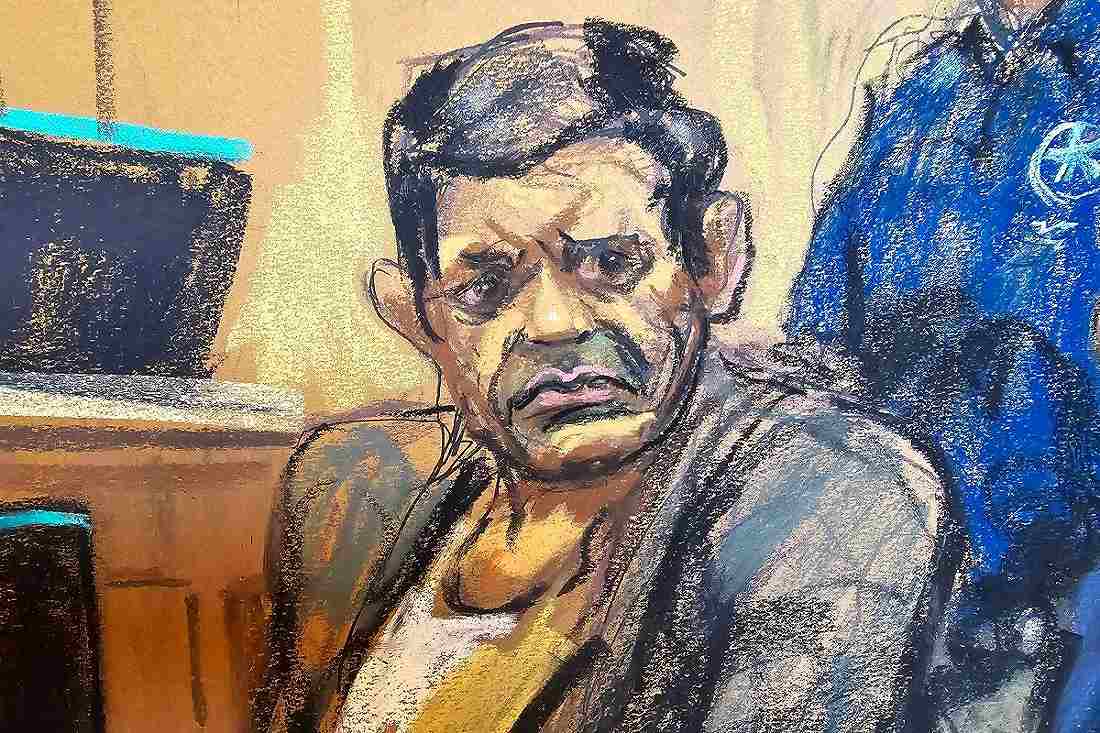
Nikhil Gupta, accused by U.S. federal prosecutors of plotting with an Indian government official to kill Gurpatwant Singh Pannun, a U.S. resident who advocated for a sovereign Sikh state in northern India, appears in federal court after his extradition from the Czech Republic, in New York City, U.S. June 17, 2024 in this courtroom sketch.
14:27 JST, October 18, 2024
The United States has accused a former Indian intelligence officer of directing a foiled plot to murder a Sikh separatist in New York City last year, unsealing charges Thursday that, for the first time, implicate the Indian government directly in a case that has strained relations between Washington and New Delhi.
The Justice Department’s indictment of Vikash Yadav, who had been an officer in India’s Research and Analysis Wing spy service, escalates the U.S. effort to hold accountable a major geopolitical ally for what officials say was act of attempted violence on American soil. Authorities had refrained from charging Yadav in the 16 months since the alleged assassination plot was thwarted, apparently reluctant to rupture relations with India and while holding out hope that its government would follow through on a commitment to carry out a serious inquiry.
The decision to do so now follows months of frustration among some Biden administration officials who had privately voiced concerns that India’s probe would amount to a whitewash.
The charges, which include murder for hire, come as Washington and New Delhi have sought to deepen strategic ties, with the aim of countering China’s efforts to dominate the Indo-Pacific region. They also come on the heels of a surprise announcement Monday by Canada that it was expelling six Indian diplomats for alleged involvement in the June 2023 killing of Hardeep Singh Nijjar, a Sikh activist in British Columbia, and what Canadian officials contend was part of a broad campaign of violence against Indian dissidents directed by a senior official in the Indian government.
Yadav, 39, is still in India and the United States is expected to seek his extradition, officials said. The Washington Post has been unable to locate him.
“Today’s charges are a grave example of the increase in lethal plotting and other forms of violent transnational repression targeting diaspora communities in the United States,” Assistant Attorney General Matthew G. Olsen said. He said the Justice Department “is committed” to disrupting and exposing such plots, and to holding perpetrators accountable “no matter who they are or where they reside.”
U.S. intelligence agencies have concluded that senior officials in the administration of Indian Prime Minister Narendra Modi probably authorized the alleged plot, The Post previously reported. India’s Ministry of External Affairs has said targeted killings are “not our policy.”
The charges against Yadav were added to an existing indictment against an Indian citizen who is accused of serving as a middleman enlisted to hire a contract killer. In an indictment unsealed last November, Nikhil Gupta was charged with murder-for-hire and conspiracy. He was extradited to the United States in June from the Czech Republic, where he had been detained on a U.S. arrest warrant, and is in a Brooklyn jail awaiting trial. He has pleaded not guilty.
Like Gupta, Yadav faces charges of murder-for-hire and conspiracy. Yadav also was accused of money laundering. The charges mark “a big step, and it’s a step that I think shows a continued push for accountability,” said one U.S. official, who like some others spoke on the condition of anonymity to discuss the case.
Yadav and Gupta are alleged to have sought the killing in June 2023 of Gurpatwant Singh Pannun, a U.S. and Canadian citizen who serves as general counsel for the New York-based Sikhs for Justice, a group that seeks to carve from India an independent Sikh state called Khalistan.
The indictment contained the explosive allegation that the murder plot was directed by an Indian official, but it did not charge Yadav, as some law enforcement officials had urged. It referred to him only as a co-conspirator, “CC-1,” who directed the plot from India, and made no mention of the Indian spy agency.
The Post identified Yadav as “CC-1” in a story this year.
The indictment makes clear that the alleged plot was not a one-off. In May 2023, the document unsealed Thursday says, Yadav allegedly sent Gupta a message indicating he had a “target in New York” and another California. Gupta replied, “We will hit all our targets,” the indictment states.
“The attempt on my life on American soil is [a] blatant case of India’s transnational terrorism, which has become a challenge to America’s sovereignty and threat to freedom of speech and democracy,” Pannun said in a statement.
Senior Biden administration officials learned of the alleged plot and potential link to the Indian government in late July 2023, triggering a quiet effort to raise the matter with New Delhi. When that news became public last November, administration officials said they wanted to see India carry out its own investigation and hold those responsible to account. They disclosed that President Joe Biden, national security adviser Jake Sullivan and CIA Director William J. Burns had privately stressed with their counterparts the need to undertake a thorough and credible probe.
Last November, as the Justice Department prepared to unseal Gupta’s indictment, New Delhi announced it had established a high-level inquiry committee to “look into all the relevant aspects of the matter.” In the ensuing months, Biden administration officials have said Indian officials assured them they were taking the investigation seriously. But some officials within the U.S. government have been frustrated by what they said were the lack of meaningful steps taken by New Delhi.
Members of the Indian inquiry committee have been in Washington this week for talks with the Justice Department and the FBI. They updated their counterparts on their investigation, and the Americans briefed the Indians on developments in the U.S. probe, in part to help them with their efforts, officials said.
“It was meant to be presentation for them of what we know and why” defendants are being criminally charged, said the official.
The talks were “cooperative, productive,” the official said. “These were not hostile, adversarial conversations.”
National Security Council spokesman John Kirby told reporters Tuesday that India’s dispatch of a team to Washington to talk to U.S. law enforcement is “a sign that they’re taking this [investigation] seriously.”
India arrested Yadav several months ago – but on charges not directly linked to the alleged assassination effort, several U.S. officials said. He was eventually placed on supervised release, they said. While that step seemed aimed at addressing demands for accountability from the United States, it stopped short of admitting any direct government involvement in the plot.
India has employed a split strategy, greeting the allegations in Canada with defiance and denials as it offers concessions to Washington that seem aimed at assuaging the Biden administration while seeking to keep the crisis from spreading.
While the United States has confronted New Delhi over the alleged murder plot, Canada has outlined what it says is an alarmingly extensive campaign of surveillance, intimidation and violence involving Indian diplomats, criminal syndicates and a member of Modi’s inner circle. Canadian officials identified the senior Modi official as Amit Shah, who serves as home affairs minister. Spokespeople in India’s Ministry for External Affairs and its Home Ministry, which oversees national security matters, did not respond to requests for comment about the allegations.
No direct operational link has surfaced at this point between the Canadian cases and the alleged plot to kill Pannun, U.S. and Canadian officials said. However, the killing of Nijjar in Canada and the alleged attempt on Pannun have parallels, and both have drawn concern that they are part of a global effort by India’s security services to harass, coerce and kill dissidents and others perceived as hostile to the Modi government.
On Tuesday, New Delhi denied that Ottawa had presented credible evidence tying the plots back to the Indian government.
The State Department on Tuesday said Canada’s allegations were serious. “We have wanted to see India take them seriously and cooperate with Canada’s investigation,” spokesman Matthew Miller said. “They have chosen an alternate path.”
The State Department has catalogued India’s alleged engagement in transnational repression, citing in a report this year what it characterized as credible accounts of “extraterritorial killing, kidnapping, forced returns or other violence,” as well as “threats, harassment, arbitrary surveillance and coercion” of overseas dissidents and journalists.
Top Articles in News Services
-

Survey Shows False Election Info Perceived as True
-

Hong Kong Ex-Publisher Jimmy Lai’s Sentence Raises International Outcry as China Defends It
-

Japan’s Nikkei Stock Average Touches 58,000 as Yen, Jgbs Rally on Election Fallout (UPDATE 1)
-

Japan’s Nikkei Stock Average Falls as US-Iran Tensions Unsettle Investors (UPDATE 1)
-

Trump Names Former Federal Reserve Governor Warsh as the Next Fed Chair, Replacing Powell
JN ACCESS RANKING
-

Producer Behind Pop Group XG Arrested for Cocaine Possession
-

Japan PM Takaichi’s Cabinet Resigns en Masse
-

Japan Institute to Use Domestic Commercial Optical Lattice Clock to Set Japan Standard Time
-

Man Infected with Measles Reportedly Dined at Restaurant in Tokyo Station
-

Israeli Ambassador to Japan Speaks about Japan’s Role in the Reconstruction of Gaza
























